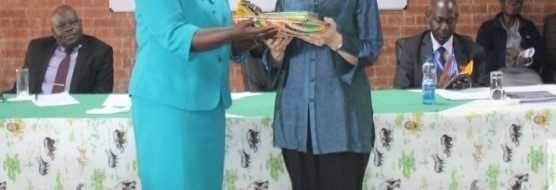
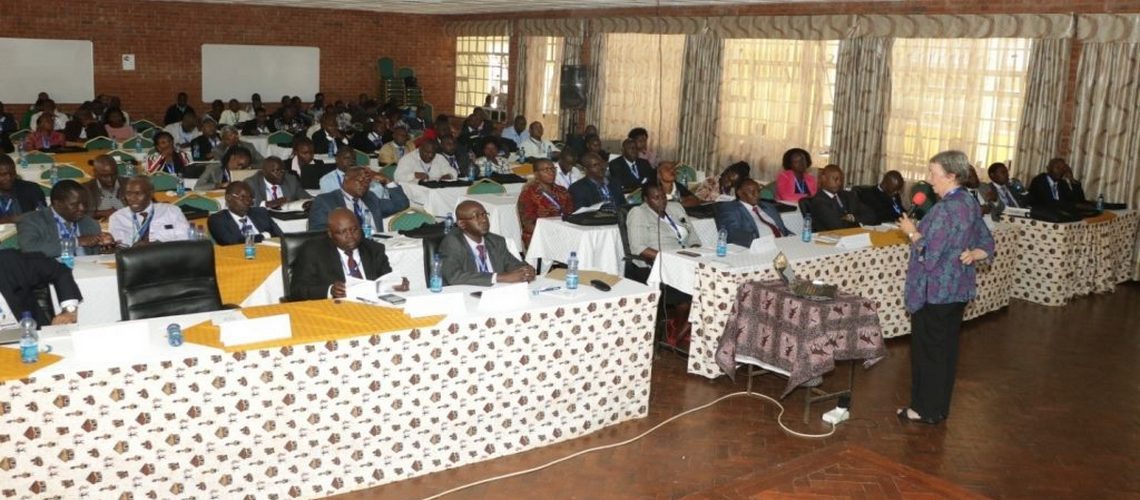
Realist evaluation is a form of theory-driven evaluation, based on a realist philosophy of science that addresses the questions, ‘what works, for whom, under what circumstances, and how’. It is against this backdrop that the University organized and successfully held the 1st Realist Evaluation Seminar in Africa presided over by Prof. Gill Westhorp from Charles Darwin University (Australia).
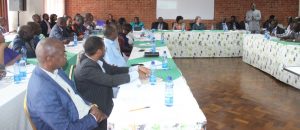
Participants are welcomed to the seminar by Registrar (Research, Innovation &Linkages)
The seminar was officially opened by the Vice-Chancellor, Prof. Lucy Irungu, who pointed out that Machakos University is continuously seeking to curve a research niche that is unique and results-based, hence the initiative to hold the realist evaluation seminar
(To the right)The Vice-Chancellor makes official address to open the seminar. Participants follow the address (left)
During the seminar, the participants were informed that the increased use of realist evaluation in the assessment of complex interventions is due to the realization by many evaluators and commissioners that coming up with solutions to complex problems is challenging and requires deeper insights into the nature of programmes and implementation contexts. These problems have multiple causes operating at both individual and societal levels, and the interventions or programmes designed to tackle such problems are themselves complex. They often have multiple, interconnected components delivered individually or targeted at communities or populations, with success dependent both on individuals’ responses and on the wider context. What works for one family, or organisation, or city may not work in another. Effective complex interventions or programmes are difficult to design and evaluate. Effective evaluations need to be able to consider how, why, for whom, to what extent, and in what context complex interventions work. Realist evaluations can address these challenges and have indeed addressed numerous topics of central relevance in health services research and other fields.
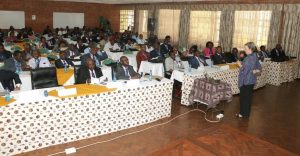
Prof. Gill makes a presentation to the participants drawn various universities within and outside Kenya
The seminar was intended to create awareness of the current trends in enhancing research skills and knowledge. As such, Prof. Gill took the participants through a short training in Realist Research Methods, particularly in formulating research questions and tools that could enable researchers to collect and analyse date within the Context-Mechanisms-Outcome framework.
From the training, it emerged that in a realist evaluation the assumption is that programmes are ‘theories incarnate’. That is, whenever a programme is designed and implemented, it is underpinned by one or more theories about what ‘might cause change’, even though that theory or theories may not be explicit. Undertaking a realist evaluation requires that the theories within a programme are made explicit, by developing clear hypotheses about how, and for whom, to what extent, and in what contexts a programme might ‘work’. The evaluation of the programme tests and refines those hypotheses. The data collected in a realist evaluation needs to enable such testing and so should include collecting data about: programme impacts and the processes of programme implementation, the specific aspects of programme context that might impact on programme outcomes, and how these contexts shape the specific mechanisms that might be creating change.
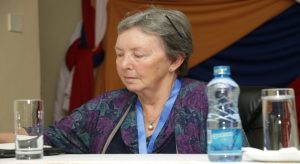
Prof. Gill Westhorp
Prof. Gill is a realist research and evaluation methodologist and a Professorial Research Fellow at Charles Darwin University, where she leads the Realist Research Evaluation and Learning Initiative (RREALI). She also runs a private consultancy business specializing in realist research and evaluation. She is co-author of the international publication standards and quality standards for realist evaluation and realist literature review. Prof. Gill has provided in excess of 70 training workshops in 14 countries, developed several new methods for realist research and evaluation, and published in realist methodologies. In 2018 she was made a Fellow of the Australian Evaluation Society. She is currently working on two aspects of realist philosophy – epistemology (knowledge) and axiology (value) – and their implications for evaluation methods.
(From left) Prof. Gill receives a gift from the Vice-Chancellor (Prof. Lucy Irungu), Deputy Vice-Chancellor (Research, Innovation & Linkages)-Prof. Peter Mwita & Deputy Vice-Chancellor (Academic & Students’ Affairs)-Prof. Joyce Agalo.
THE EAST AFRICA REALIST EVALUATION HUB FORMED
The seminar and training culminated in the formation of the East Africa Realist Evaluation Hub, whose Centre is here at Machakos University, under the lead advisor Prof. Gill Westhorp. A series of activities and events are being drawn towards the realization of the set targets. The University is pleased to welcome membership of those willing to join the East Africa Realist Evaluation Hub.




